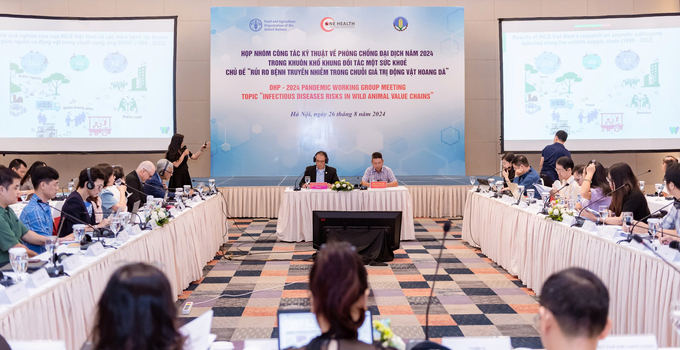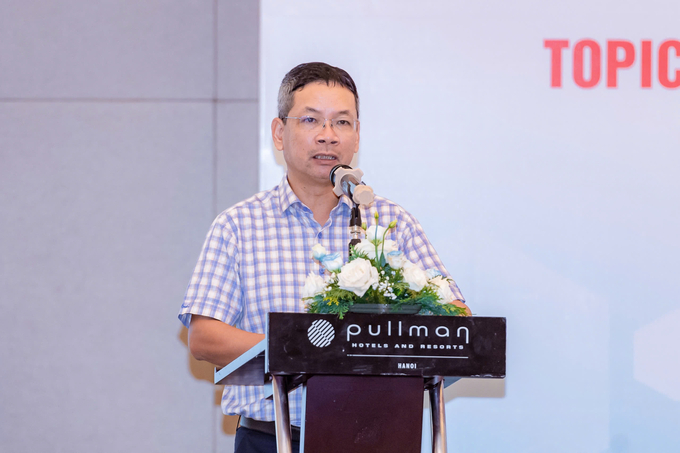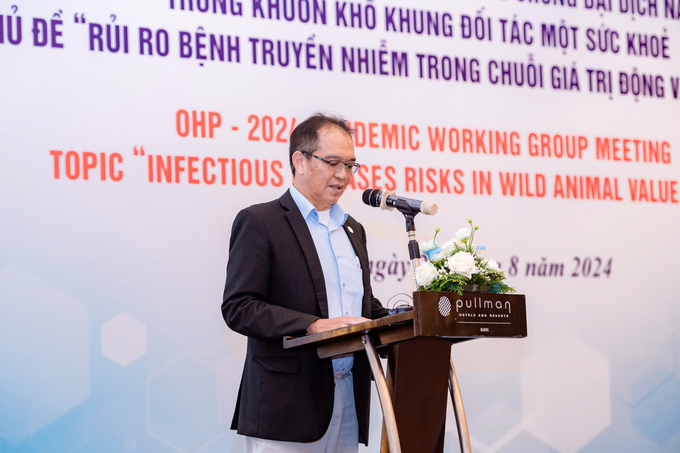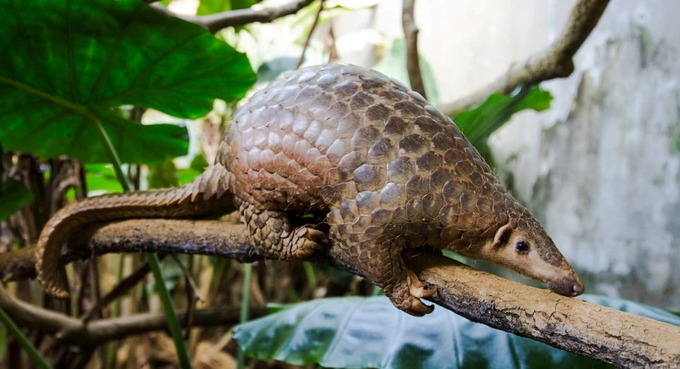May 31, 2025 | 01:35 GMT +7
May 31, 2025 | 01:35 GMT +7
Hotline: 0913.378.918
May 31, 2025 | 01:35 GMT +7
Hotline: 0913.378.918

Multi-sectoral Working Group Meeting on Pandemic Prevention with the theme in 2024 "Risks of infectious disease in the wild value chain" taking place on August 26. Photo: LL.
On August 26, 2024 in Hanoi, under the framework of the One Health Partnership for Zoonoses (OHP for Zoonoses), according to the regular mechanism, the Ministry of Agriculture and Rural Development coordinated cooperated with the Food and Agriculture Organization of the United Nations (FAO) to organize a Multi-sectoral Working Group Meeting on Pandemic Prevention with the theme in 2024 "Risks of infectious disease in the wild value chain".
The meeting was co-chaired by Mr. Vu Thanh Liem, Head of the OHP Secretariat, Deputy Director of the Department of International Cooperation and Mr. Pawin Padungtod, Senior Coordinator of the Emergency Center for Transboundary Diseases (ECTAD, FAO) with the participation of representatives from specialized Departments under the Ministry of Health and Ministry of Industry and Trade; Ministry of Natural Resources and Environment, Department of Agriculture and Rural Development and more than 20 provinces and cities (online participation), private sector, institutes and associations, especially the active companionship of bilateral international development partners and multilateral organizations joining hands to commit to a healthy Vietnam.
Mr. Vu Thanh Liem emphasized the implementation of international commitments on disease control from wild animals, especially captive wild animals. Vietnam is making efforts to coordinate with the international community to implement measures to address the drivers of wild animal meat consumption and ensure ecological balance, trade and enhance sustainable management. wildlife farms, increasing awareness of central management agencies, grassroots and community awareness about the dangers of wildlife consumption.

Mr. Vu Thanh Liem, Head of the OHP Secretariat, Deputy Director of the Department of International Cooperation. Photo: LL.
Recognizing the urgency of addressing these challenges, the One Health Partnership Technical Working Group on Pandemic Preparedness (PWG) was established to support government and societal efforts to prevent future pandemics by managing human-animal-ecosystem interactions, with a focus on limiting the commercial trade and consumption of wildlife.
This is a specialized technical mechanism for relevant parties to exchange, review, and propose cooperative activities, programs and projects on pandemic prevention, as a basis for proposing policies for the country.
Dr. Padungtod co-chaired the meeting, said: This is an opportunity to share project results, and analyze opportunities and challenges on the risk of emerging infectious diseases (emergence and exposure) in the value chain. Wildlife Management and Wildlife Farm Management, analysis of gaps, and propose strategic approaches to improve management and biosecurity at facilities raising wild animals.
Therefore, the Working Group in the coming time should join hands and contribute resources to support the OH Partnership Framework to review and amend regulations that are not in accordance with international requirements and ensure safety for human health, livestock and the environment through strengthening biosecurity solutions at wildlife facilities to minimize the risk of emerging infectious diseases (EIDs) in wild animal farms; Gain insights into how a systems-based approach can reduce the risk of pathogen spillover at the human-animal-ecosystem interface.

Mr. Pawin Padungtod, Senior Coordinator of the Emergency Center for Transboundary Diseases (ECTAD, FAO). Photo: LL.
The meeting highly agreed on the comprehensive and multi-sectoral approach of One Health, affirming the spirit of common responsibility in controlling the risk of emerging infectious diseases in the value chain wildlife and strengthening biosecurity solutions in the management of wildlife farming facilities, committing to actively coordinate, support each other and demonstrate common responsibility for a safer and healthier community.
In an interview with Vietnam Agriculture Newspaper, Mr. Pawin remarked that Vietnam has been very active in minimizing the risk of disease transmission from wildlife. Over the past year, many laws and regulations have been updated to enhance these efforts, Mr. Pawin assessed.

Strengthening biosecurity measures will help minimize the risk of diseases and ensure the sustainability of wildlife management activities in Vietnam. Photo: SVW.
FAO also, with USAID support, work closely with the Site Test Management Authority and the Forest Protection Department to monitor the captive wildlife facilities and update the species and also the management of these facilities in Vietnam.
This provides a basis for developing surveillance that can monitor and provide information on disease risk along the wildlife chain.
In the coming time, FAO will collaborate with the Government of Vietnam through the Ministry of Agriculture and Rural Development, first of all, to develop a surveillance system. FAO is about to expand biosecurity work based on the lesson that we learned and the works that we have done on improving biosecurity in livestock production, and apply those to the wildlife value chain, said Mr. Pawin.
Mr. James Compton, Project Leader of the Wildlife TRAPS USAID initiative, TRAFFIC, believes that collaborating with health experts to apply a systematic approach in understanding the trade chain from supply to end-users is crucial.
Analyzing the interaction between humans and wildlife helps accurately identify risks and develop mitigation strategies, thereby improving wildlife trade management by integrating the One Health approach.
"We hope as an NGO will continue supporting government efforts to prioritise these risk management interventions and also to prioritise the budget allocation and the technical and human resources. So we have a number of resources that are necessary to work with a number of different actors from source to end use in Vietnam,” Mr. James shared.
Translated by Dieu Linh

(VAN) Several scientists and farmers are experimenting with soil treatment in some key durian-growing regions such as Cai Lay (Tien Giang), Dak Song, Gia Nghia, and Dak R’lap (Dak Nong).
/2025/05/25/4127-3-073637_820.jpg)
(VAN) Thanks to the promotion from an FAO-implemented project, vegetable production in greenhouses in Moc Chau has seen strong development, from 1.5 hectares in 2021 to nearly 50 hectares in 2024.

(VAN) FAO has recently supported USD 140,000 to implement the project 'Risk mitigation human-animal interface risks through disease control initiatives in pig farming.'

(VAN) The People's Committee of Tra Vinh province has approved an adjustment to the investment policy for the Green Hydrogen Plant project, increasing its area to approximately 52.76 hectares.
![Reducing emissions from rice fields: [2] Farmers’ commitment to the soil](https://t.ex-cdn.com/nongnghiepmoitruong.vn/608w/files/news/2025/05/05/dsc08881jpg-nongnghiep-140632.jpg)
(VAN) Clean rice cultivation model in Thuong Tan commune, Bac Tan Uyen district, is assisting local residents in achieving sustainable agriculture by substantially reducing costs, increasing productivity, and protecting the environment.

(VAN) At the conference to disseminate Resolution No. 68, AgriS introduced its digital agricultural ecosystem and reaffirmed its commitment to accompanying the Government in promoting private sector development and sustainable agriculture.

(VAN) 'Blue Ocean - Blue Foods' initiative is designed to restore marine ecosystems and establish sustainable livelihoods for local communities by cultivating a minimum of 1,000 hectares of cottonii seaweed in the first three years.